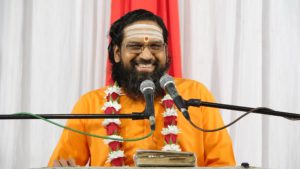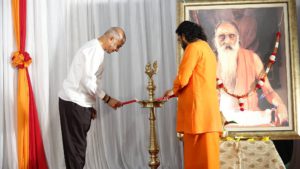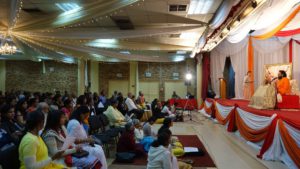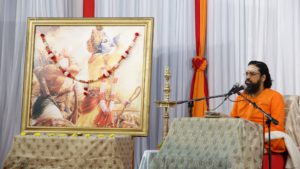Yagna on Bhagawat Gita – “Think wisely, Live joyfully” – July 2017
Talks on Bhagawat Gita – “Think wisely, Live joyfully” – by Swami Abhedananda
(Gyan Yagna conducted from 21st July till 23rd July, 2017)
Key Points from the Discourses
Day 1
In line with the topic – ‘Think wisely, Live joyfully’, on the first day of the Gyan Yagna, Swami Abhedananda shared various examples to illustrate how an untrained mind, devoid of spiritual guidance, can rob one of all his talents & land one into a state of dazed confusion. Swamiji then shared how Gita, the most foundational Hindu scripture, is a great lighthouse to guide one towards a joyful and inspiring life. Below are a few notable excerpts from the day’s discourse:
- Life is an interesting journey; it brings forth something new each day; and what is interesting is that with each new outer day, our inner perceptions & responses are also new. We don’t know how we will respond to a certain situation. Arjun, who was such a giant warrior, who prepared for 12 years to kill the Kauravas, when the time of war came and he was faced with Bheeshma and Drona, he collapsed!
- Arjun declared, ‘I won’t fight!’ In 12 years, Arjun had sufficient time to think whether he should fight or not. But at the spur of moment he got puzzled. Bhagwan knows how to bring out a person’s weakness. Suppose you have anger, so Bhagwan will do something so that someone will come in your life to provoke you. If you have the tendency to be jealous, Bhagwan will put a competitor around you, who would be little better than you. When Arjun asked, “With whom do I have to fight?” Bhagwan purposely took the chariot in front of Bheeshma and Dronacharya; the two people who were very close to Arjun and to whom Arjun was very dear.
- Life is not simple. You may have a comfortable life, but not an easy life. More than physical problems, we suffer with mental problems. Life doesn’t ask you “Are you ready?” Situations don’t ask you, “May I come in?” They simply barge in! We face difficulty is thinking and responding maturely. Arjun couldn’t respond properly at that time when it was very crucial.
- Arjun got bewildered and confused. To be confused and to be wrong is not a problem but to think that you are right even when you are wrong, is a problem. Sign of a matured person is that he knows when he goes wrong and knows the way to correct himself.
Realizing the truth about the world
- In the 2nd chapter of Bhagwat Gita, Arjun started shivering and crying. Despite being a kshatriya (warrior) and being highly talented, Arjun started crying in front of everybody. We think that talents are very big thing, but the truth is that no talents, no qualifications, no contacts come to rescue when we need. Arjun was extremely talented, he had many great achievements, but only thing he forgot was how to keep his mind cool and quiet at the time of battle.
- Anything done in the outer world never gives us lasting peace or joy; and all the worldly things attained by us are only meant to be lost in time. When we realise this, we try to seek a permanent solution to our sorrows. We develop the desire to remain untouched by all outer situations. When Arjun realised this, the real Gita started!
- Arjun realised that he was confused and he is finding no solution in the world. The day a person realises that the world cannot give him a permanent solution, he becomes a disciple; that day in the seeker’s life is Diwali.
Gita is for You
- We think Gita is for old people, or to be chanted when someone passes away. But the truth is,
- Gita is not for the dead; it is very much for a live person, who is in the pink of his youth, surrounded by temptations and is at the cross-roads of morality & ethics.
- Gita is for the one who has to face challenges everyday…at office or home or elsewhere.
- Gita is the guide for the one who struggles to be equanimous amidst innumerable challenges.
- One has to have a sound base of right understanding of life and death, of success and failure, of friend and enemy, and of the world. More than material knowledge, spiritual knowledge is required in our lives. Spiritual life makes you like a giant, in front of whom, all situations appear minuscule.
- Gita brings out this giant in us; it tells how the Self (Atman) alone is and the world outside is just a play of maya. Gita is that which provides the guidance & confidence to achieve great things in the world outside while remaining strongly anchored in the Self always.
Day 2
On the second day of the gyan yagna at Kendra hall, Swami Abhedananda enlightened the audience with the knowledge of Karma Yog & Bhakti Yog. Quoting the exemplary life of Bhagwan Krishna, Swamiji also encouraged everyone to develop a strong spiritually rooted character which will provide the needed strength to sail through the ups and downs of life.
Nothing can replace listening to satsang directly from a saint but we can all benefit by reading and internalizing the below excerpts from the discourse:
 Bhagwan Krishna’s Exemplary Life
Bhagwan Krishna’s Exemplary Life
Gita is the ultimate guide to make our life simpler, easier, and more poised. It is the way through which, in spite of all troubles and tribulations around us, we can learn to smile. It is very easy to be sad, to be angry, and to expect; these emotions are very common, but if someone is able to conquer these, he becomes a king. Bhagwan Krishna’s life has been exemplary in this regard:
- Before the Mahabharat war started, Arjun was crying while Bhagwan Krishna was smiling. There were more relatives of Bhagwan Krishna than of Arjun, because Bhagwan’s entire army was fighting from the side of Kauravas, still Bhagwan was smiling.
- Bhagwan Krishna’s life was extremely difficult; nobody would like to have a life like that. First of all, nobody would like to be born in a jail. Nobody would like that because of him, his parents be in constant trouble and siblings getting killed. Bhagwan Krishna, from a very young age, had to face a number of challenges. When he was 11 years old, he was taken to Mathura and he had to leave his mother, father & all his friends behind. After being in Mathura for 14 years, again he had to leave because of multiple attacks from Jarasangh and Kalyavan. It is written in Mahabharat that when Bhagwan fled from Mathura, he had to run bare-foot but still he was smiling.
- After that, Bhagwan Krishna went to Dwarka and there also life was not easy. Everybody doubted that Bhagwan Krishna stole a precious gem (named Syamantak mani), so much so that Bhagwan’s wife Satyabhama, and brother Balram, all doubted him; but still Bhagwan kept smiling.
- Bhagwan Krishna’s end of life was even worst. It is written that all his kith and kin started hitting each other, and when Bhagwan Krishna tried stopping them, they started beating Bhagwan too! Last but not the least, Bhagwan had to shoot down each and every son of his. Imagine Bhagwan’s plight! Still He was smiling.
No matter what the situations were, Bhagwan Krishna managed to smile all the time and remain poised. Life demands that we should be much mature in our responses. Bhagwat Gita is our mother who teaches us how to bring out that matured response and how best to live life!
- In the 2nd chapter of Gita, Bhagwan says, ‘Yogah karmasu kaushalam’ meaning ‘Dexterity in action is called yog’ (2.50). Dexterity and expertise in action, expertise in living life, is when we have reduced our wants to such an extent that we become a very strong giver in our life. Our actions should only be aimed to please the Lord. If we expect response from others, it will only become the source of our sorrows. The discipline that brings out this kind of mind, which makes us available for the Lord, is called Karma Yog.
- Gita instructs us that instead of becoming a man of selfish actions, we should become a man of selfless actions. The centre of our life should not be our small ‘I’ (our joys, sorrows, or ego), instead it should be something big, something higher.
- Maintain Equanimity:
- Bhagwan has said, “Yogastha kuru karmani, sangam tyaktva dhananjaya” (2.48) and “Mukta sangha samacharah” (3.9); these words imply that you should not have attachment with any person or any action. Because wherever you are attached, in that area your equanimity is lost. Whomsoever you are very close to, he becomes a big problem for you.
- Bhagwan also says, “Sukh dukhe same kritva, labha labhau jaya jayao…” (2.38), i.e., be equanimous in joy and sorrow, in loss and gain, and in victory and defeat. Let the outer situations come and go, don’t get affected by them.
- Accept what you cannot change:
- Karma Yog depends on “Ma phaleshu kadachan” (2.47), which means, you are not entitled to the fruits of your actions and thus, what you are going to get is not in your hands. Who will insult you, or honor you is not in your hands. Things won’t happen as per your wish. We need to have equanimity everywhere. That is the principle of Karma Yog.
- A situation is not powerful; it is our expectations from that situation which makes it powerful. An individual person is not our problem, but our expectation from that person is a problem.
- Success of Action:
- Another important aspect about Karma Yog is that – Action is not meant to complete the action; action is meant to derive the feeling of completeness via the action. Success of action is how much fulfilled you are after doing that action. After getting angry, no one feels happy, no one feels quiet. Action is a medium through which you please God and Guru. Action is not a medium through which you please your own ego. Measure your success of life by the amount of purity, divinity and quietitude you get after your actions.
- Actions are meant to be like a flower and through these actions, we should try to please the Lord. Hence, Karma Yog is a way to worship the God. Everywhere in Gita, Bhagwan has said “Do your action for me” – “Mayi sarvani karmani…” (3.30), “Yad karoshi, yadashnaasi…” (9.27).
- Maintain Equanimity:
Bhakti Yog
- If you are doing Karma Yog, Bhagwan will take you to Bhakti Yog. While doing good actions, when one sees that there are certain things that are not by his doing, he realizes that God must have done it. Success in action is not achieved unless we graduate to Bhakti Yog.
- As we start experiencing the happiness of God, we start becoming His devotee. When Lord is happy upon you, situations become quieter and our intellect becomes brighter. Every day we wait to see what God has planned for us. There is a joy in our life when we have a higher goal.
- Area of action is very unpredictable. Things do not always happen as we want, they happen as God wants. But when we have the intention of pleasing God with our actions, God gives us a special intellect to face the uncertain situations. When we give a bigger role to God in our life, we will find our life to be quiet and peaceful. We should only focus on giving our best and leave the result in God’s hands. We need an active God in our life who can give us strength, power and intellect. And once we make the God active in our life that is called devotion; where Karma yog culminates into Bhakti yog.
- Therefore in Gita, Bhagwan repeatedly says, “Manmana bhav mad bhaktah…” meaning “Give your mind to me” (9.34). We all have mind but we give it to money, or job, or relatives etc. Instead, love God, talk to Him and tell Him, “Other than You, there is no one in my life. Please make me Yours!”
- Biggest requirement of anybody’s life is love for God. We think food, money or relatives are our biggest requirement. You love God, and everything you need will automatically come to you. We spend time with our husband, children, internet, newspaper, phone, but how long do we spend time with Bhagwan? You should go to your puja room and tell the Lord, “I love you Bhagwan! Oh Bhagwan, you give me any disease, any pain, any tragedy, but please be happy with me! Your happiness is my strength. Take me anywhere, give me poverty if you want, but please be happy with me. If You are happy, I get everything. I will not resist anything from you.” Loving is accepting without resistance…what Bhagwan wants to give us or take from us.
Thus, from a man of selfish actions, you became a man of selfless actions, and ultimately you become a man of God alone. That is the true fruit of living!
Day 3
On the last day of the Gyan Yagna, Swami Abhedananda beautifully concluded the talk inspiring everyone to make their lives a constant celebration through the teachings of Bhagwat Gita, which is nothing but the manifestation of Bhagwan’s unbounded grace upon all.
- As ignorant individuals, we keep living a purposeless life, dragging somehow from morning till evening, slogging in the office, in the house, taking care of our near and dear ones, but never worrying about our real growth. We don’t pursue any higher goal in life, and are just pushed from one situation to another situation.
- Do we know the true meaning of growth in life? Over the years, has our mind become more quiet and equanimous? Has our anger and attachment lessened? Have we come close to God? Has the dream yet come that let our mind become Vrindavan, and Bhagwan Shri Krishan should dance there? Do we have the vision that we should go to a Guru and serve him? When such questions arise in our mind, and we don’t want to live a routine life of earning, eating and sleeping, rather we want to live a selfless life, then that is called the real progress of a person.
Purpose of Karma Yog
- Anybody has sorrow in his life because there is some mental impurity in him. Karma Yog is a process through which we get out of our impurities. It can be impurity of jealousy, passion, anger, ahankaar, laziness, or worry.
- Karma Yog is a process through which we live a surrendered life. If anybody is sad, it is not because he has less money; it is because he is not surrendering himself. Our sadness is because we are not able to give-up our issues to God, and we are not able to dilute our individuality and become soft.
- The purpose of Karma Yog is to get rid of our negativities. Hero is the one who has conquered his anger and attachment. Karma Yog is a technique through which we remain unaffected by the outer situations; and remain ever quiet and happy. Karma Yog takes away the fangs of selfishness in us.
Performing Actions is not equal to Karma Yog
- Understand that ‘Action’ is not equal to ‘Yog of Action’. Just as anybody who puts-on a stethoscope is not a doctor, similarly anybody who does a lot of actions is not a Karma Yogi.
- To be Karma Yogi, you need to be devoid of attachment and aversion. Gita says, “raag dwesh viyuktaistu vishayan indri aishcharan…” (2.64) i.e., “One who controls the mind, and is free from attachment and aversion, even while using the objects of the senses, attains the grace of God”.
- You must serve, but not to get rewards from anyone, but to please the God. For whom you do a lot that sometimes become bondage for you because you start expecting from him. World is not designed and framed to fulfill our expectations and desires; world is designed to serve and drop our ego. If you are ready for this deal, then alone you will be called a true Karma Yogi.
- In Gita, Bhagwan has also said, “Mayi sarvani karmani…” (3.30) i.e., “Surrender your actions to Me!” When you serve someone selflessly, even if that person doesn’t acknowledge, you feel happy within. When you aim at this internal reward then you become Karma Yogi.
- A selfless, egoless, anger-less, serving person is a very happy person. The life of a giver, is the life of a king. All unhappy people are those who don’t give and serve. Everybody has a lot of capacity to give. If nothing else, you can at least give a smile, or say some sweet words. The way of obliterating our wrong desires, the way of rubbing-off our anger and expectations, that kind of life is called the life of a Karma Yogi.
Karma Yog is a Lifestyle
- That lifestyle which makes us leave our likes and dislikes, and makes us embrace even the one who dislikes us, and makes our mind free of passion, anger, jealousy, competition, pride, that is called Karma Yog and it has to be practiced at every moment of life.
- When our wrong self is too big, our demands are too much. It is the disease of a person that although he is very small but he thinks himself to be big, or he wants someone else to think himself as big. That lifestyle which takes away our demanding personality, reactive personality that is called Karma Yog.
- Whole life is a learning session. Wherever you drop your ahankaar, you will be rewarded, and wherever you become assertive, you will lose. Purpose of living is to beautify our heart, our intentions. Therefore Gita says, “Vidheyatma prasadam adhigachhati” (2.64), which implies, one whose mind is under his control, he is comfortable and happy all the time.
- The path of Karma Yog is to get free. Those who are Gita followers, whether something happens or not happens, their independence don’t go. No place is too important, no person is too important for them. They are not insistent upon anything.
- The proof that you have lived the life of selflessness and Karma Yog is that, you become a devotee of God. As much as you are selfless, so much God will enter your life and when God enters your life, your life becomes a miracle. God becomes the main actor in your life and you become the silent actor.
- We think that unless we get close to our husband, wife, children, we won’t get joy. But all that closeness only bears sorrow. Get close to God instead! You get close to God when you realize that God alone comes to your rescue when you need. Call Lord in your life. See how much He loves you. He will do your work. Karma Yog will definitely take you to Bhakti Yog.
- The biggest strength of a person is that he has love for God and God has love for him. Your strength is not your money, power, talent, beauty, job, house, or family, your strength is how much God has melted because of you with your sadhana, honesty, love, and your lifestyle.
- When you have the conviction that ‘My Lord will do anything for me’, that is your victory. Saints become saints because they realize this fact. Kabirdasji says – Even if an ant has jingles in its feet, that too God listens. Then why won’t He listen to us?
- Bhagwan says in the 11th chapter, “Mat karma krit, mat parmah…” (11.55) – “Arjun! Do your actions to please me and not your ego. Consider me to be the supreme. Let nothing become bigger than me. Those who are free from attachment, and are without malice towards all beings, such devotees certainly come to me!”
- We feel that some doing arti, agarbatti is Bhakti. That is a process of Bhakti, that is also important, but don’t get fulfilled only by doing that. Bhakti is leaving your present and future issues to God. Bhakti is smiling even when Lord takes away everything from your life.
Gyan Yog
- We think we are a small individual in this world. ‘Gyan Yog’ says ‘you are not in the world, the world is in you. Let all changes happen, you remain as the witness of all changes.’
- Gyan Yog tells that there is a ‘Changing I’ and an ‘Unchanging I’. The ‘I’ that changes from morning, to evening, till the night, is been seen by the ‘Unchanging I’. This ‘Unchanging I’ is same of all of us and therefore when we sleep everybody’s sleep experience is same. And thus it is said that same Atma is pervading in all. Investigation about that Self or Atma is Gyan Yog.
- Gyani is the one who sees that ‘Unchanging I’ and is therefore uninfluenced by everything.
Through Gita, let us make our life a celebration. Celebration is confluence of our pure desire and unbounded grace of God. Our desire was there to listen to Bhagwat Gita and Bhagwan made us listen some Gita by showering His words, which made our time a celebration. Let us pray that this celebration never ends!







